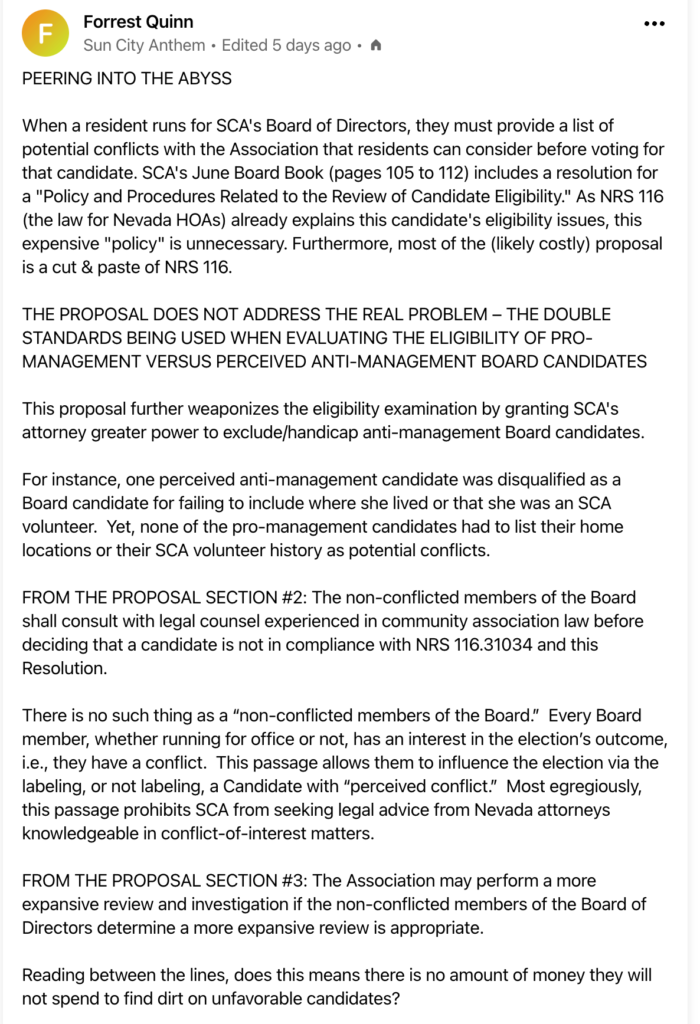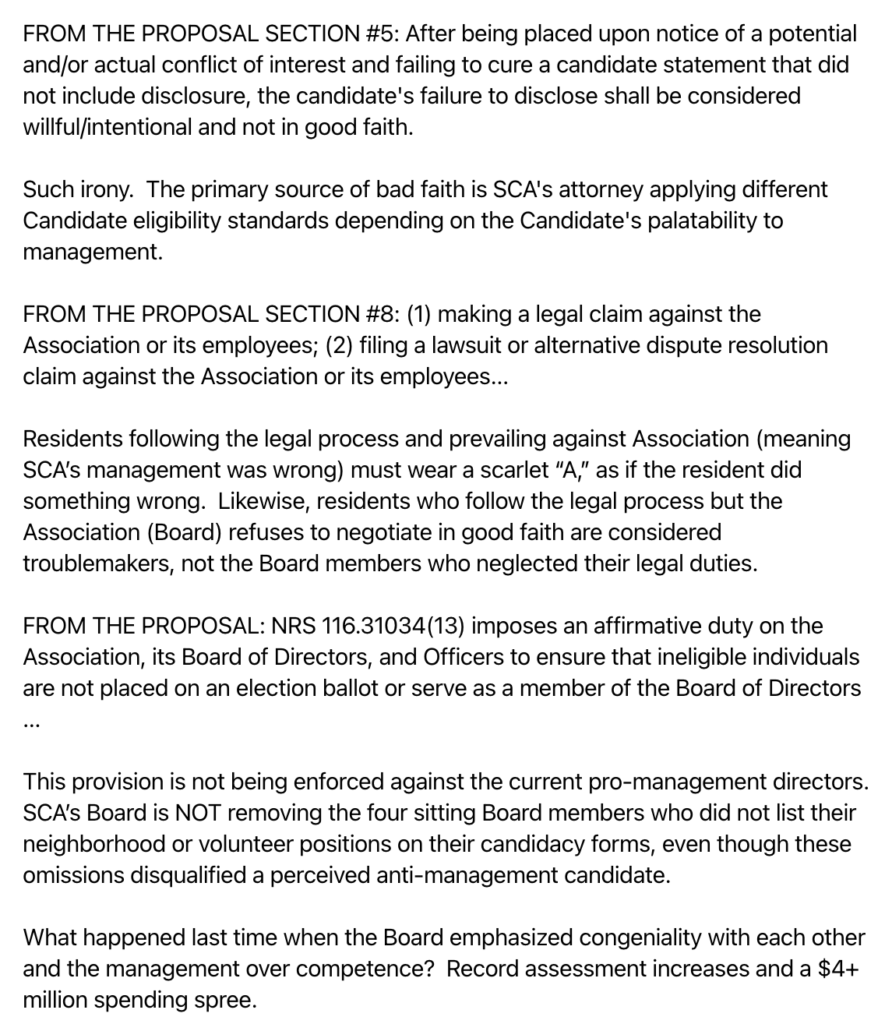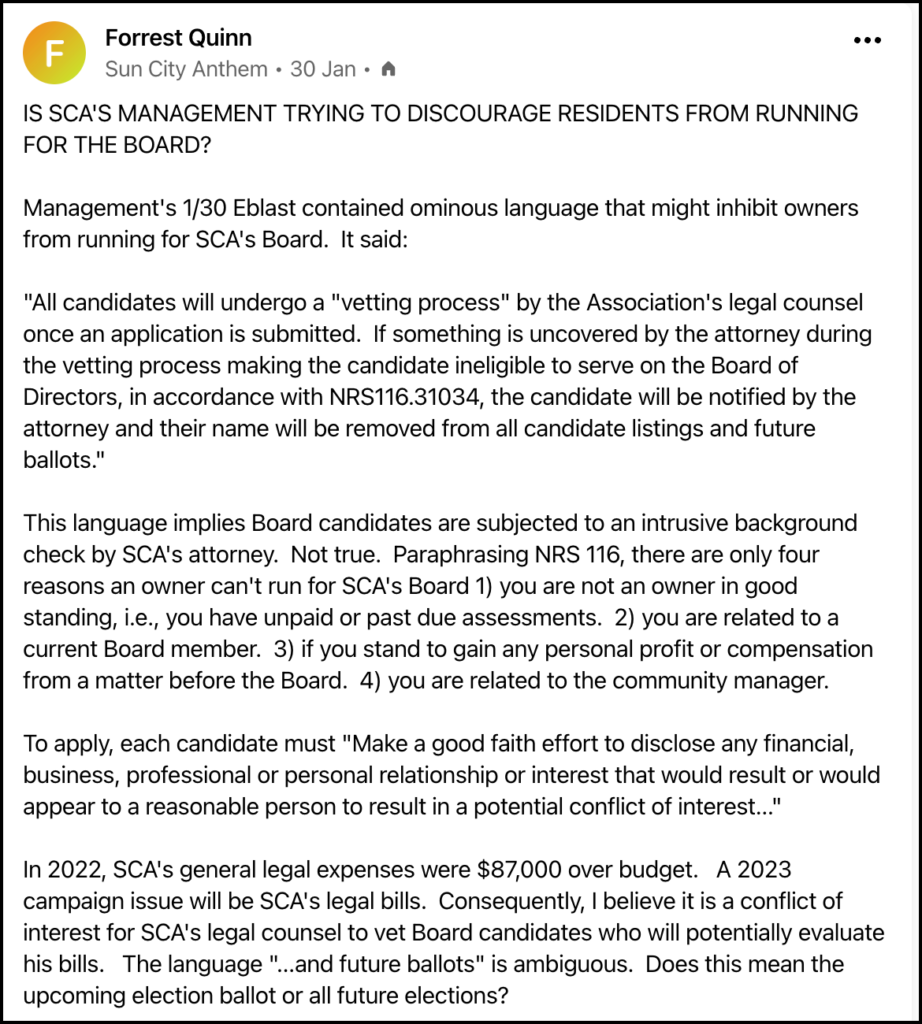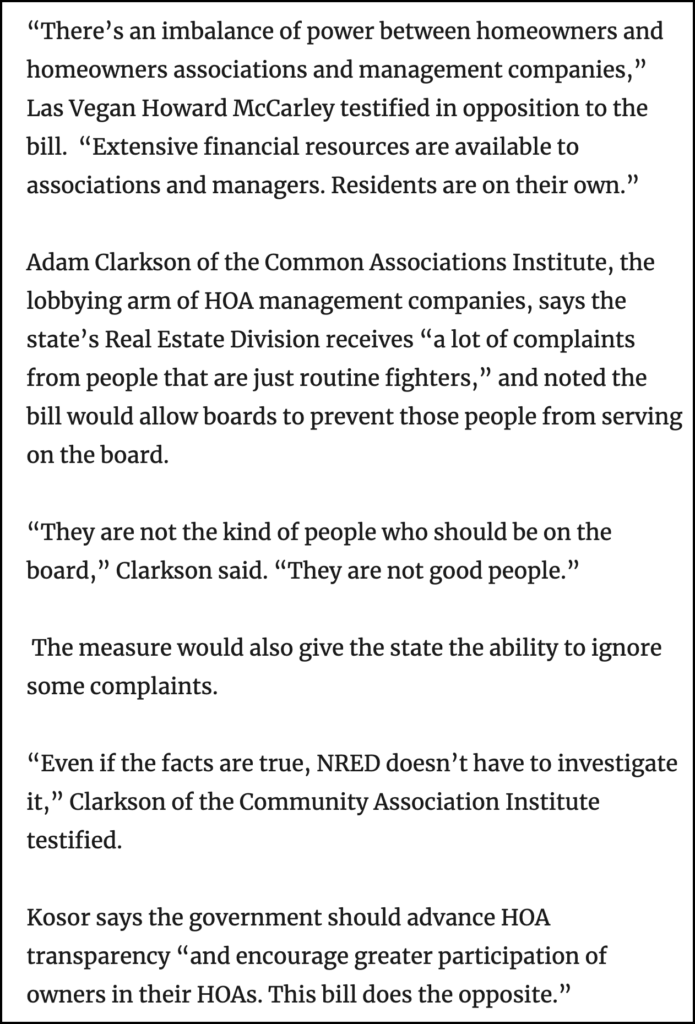Quoted below is Forrest Quinn’s excellent NextDoor June 22, 2023 post about Adam Clarkson’s adding his own requirements for residents to serve on the SCA Board. Since I am the poster child of this particular form of homeowner abuse, I thought I’d give you the back story of how it all started and how much, much worse it’s become since 2017.


Backstory
Sun City Anthem was managed from the time it went from developer (Del Webb) control to “self-management” by a contract manager, FirstService Residential (FSR) that also held the Nevada NRS 649 debt collector license and using a wholly owned subsidiary doing business as Red Rock Financial Services was the HOA’s debt collector and foreclosure sale trustee. Remember that all HOA managers are fiduciaries by law even when they are performing debt collection functions. Attorneys are also supposed to be fiduciaries even when they are acting as HOA debt collectors. (You have to remember that because they have forgotten.)
During the transition to “self-management” Sandy Seddon was hired 11/1/15 to overlap with FSR as a shadow manager to transition the systems at a base salary of $250,000, $100,000 more than the Sun City Summerlin full-time manager who was hired at the same time. Many people objected, including me, when six months after she took over after FSR’s departure in late 2016, the Board gave her a $20,000 bonus. I went to the HOA office and found that we actually had a separate Community Association Manager, Lori Martin, besides Sandy Seddon who was called the General Manager at that time. I requested a copy of the HOA’s management performance compensation policies and to see if any market surveys that had been done to set her salary. CAM Martin informed me that there were no policies, that the Board had essentially unfettered discretion to set the pay. When I asked, “so they could pay her a million bucks a year?” The answer was yes.
I ran for the Board in 2017 and was elected on 5/1/17 with 2,001 votes. On the same day I took my elected Board seat, Adam Clarkson’s 1st unethical, improperly obtained contract to be Sun City Anthem’s (SCA’s) debt collector and legal counsel.
NRS 116.31086 requires that an HOA Board selects vendors by an open bid process contract bids. SCA Board put out an RFP for a new debt collector to replace FSR dba Red Rock in 2015 and after a full public evaluation of the competitors, selected Alessi & Koenig, LLC to be SCA’s debt collector.
In January 2017, I sent a recommendation to the SCA Board to fire the debt collector because Alessi & Koenig, LLC had filed for Chapter 7 bankruptcy, and they had misled the Board into modifying its contract to a successor entity that had been used to conceal assets from creditors. Instead of putting out a new RFP for a debt collector as required by NRS 116.31086 or even thanking me, Seddon and the Board ignored me.
I filed an application for the Board on 2/5/17, and Lori Martin told me I had to put on my conflict of interest form that I had filed a civil complaint to quiet title of my late fiance’s home that Red Rock had wrongfully foreclosed three years earlier without notice after Red Rock rejected multiple assessment offers that cured the delinquency and had unlawfully kept virtually all the sale proceeds. I told her I wanted the HOA to work with me to settle at no cost without litigation because the HOA shouldn’t cover up the former agents’ wrongdoing. My interest in the Board was to assist SCA become a first-time employer to set up personnel performance, accountability, transparency and compensation policies as that was my professional expertise.
The opinion of SCA’s legal counsel of the time interpreted NRS 116.31034 to allow me to run for the Board so Seddon got the Board to select a new General Legal Counsel for the HOA at the April 2017 meeting before the next Board was seated.
SCA’s litigation attorney in my quiet title/excess proceeds case agreed to settlement negotiations in March 2017 that I had initiated to attempt to achieve a mutually-beneficial resolution of the wrongful foreclosure action at no cost to SCA or to me before the 5/1/17 SCA Board election.
Rather than allow me to have my rights under SCA CC&Rs XVI: ADR & Limitation on Litigation, and for no good purpose, SCA management changed the litigation attorney to one who rejected my 3/22/17 no cost settlement offer unilaterally without taking it to the SCA Board for approval and without consideration of the best interests of the Bound parties.
Seddon, in concert with my competitor for one of the vacant 2017 Board seats, Board President Rex Weddle, orchestrated another unlawful manipulation of NRS 116.31086 before the 2017 election to bring Clarkson in as SCA’s debt collector without an RFP and without agendizing the Board action to do so at the April 2017 meeting before the new Board was seated.
Once Clarkson started at SCA with the power of two highly incompatible roles on the same day as I was seated in my elected position, the relentless campaign to keep information from me, to treat me differently from other Board members ensued.
At my first SCA Board meeting, Clarkson got the Board in closed session (after removing me) to order me to recuse myself from all collection matters regardless of whether there was any relationship whatsoever to the 2014 wrongful foreclose conducted without valid SCA Board approval at an open Board meeting by SCA’s former agents who had unlawfully kept $57,282.32 excess proceeds from the sale that belonged to me.
Even though I knew NRS 116.31084 defines how a Board member recuses herself if there is a conflict, I didn’t argue because I expected the litigation could be quickly settled, not realizing that Clarkson and the new litigation attorney were going to obstruct the litigation.
Clarkson and the litigation attorney not only refused to produce SCA’s enforcement records, SCA Board agendas and minutes, or any of SCA’s official records of probative value to my case, but instead produced the unverified, uncorroborated, incomplete, inaccurate and falsified records of SCA’s former agent Red Rock, misrepresenting them to the Court as if they were SCA’s official records.
Clarkson’s obstruction of my litigation and my Board service conceals a corrupt system he wants to perpetuate
I was forced into litigation, and then my litigation obstructed to cover up that SCA’s former agents, FSR as manager, and FSR dba Red Rock, as debt collector, in 2014, secretly sold, and unlawfully kept nearly all the proceeds from, a dozen SCA homes to a hand full of insider speculators, for a fifth of their value, without approval at an open Board meeting as required by our bylaws 3.15 and 3.15A, for the alleged violation of delinquent assessments, without publishing the quarterly delinquency report required by SCA bylaws 3.21(f)(v), without any without the same notice as the SCA Board is required by CC&Rs 7.4 and bylaws 3.26 to provide when issuing a fine or sanction of any amount.
The core issue is HOA homeowners have rights that are guaranteed to us as the intentional beneficiaries of our HOA’s governing documents, independent of what the state law says. And independent of what Clarkson and the other CAI lobbyist attorneys say.
My problem with all the attorneys against me in the litigation is the attorneys who are supposed to be fiduciaries to the HOA, and to the homeowners as the intentional beneficiaries of the HOA for which it exists, don’t view things that way. They view themselves as representing other interests.
Clarkson’s perspective appears to be that he is a Super-Director above the Board and above the law “I am the attorney. I decide the law. You are required to act solely “on the advice of counsel”. You are prohibited from acting contrary to the attorney’s edicts. He frequently acts in his own self-interest because he has the conflicting role of being a debt collector and a particularly greedy attorney so he makes up rules to decrease transparency. He changes the wording on policies here and there to change so they don’t apply to him or Sedddon, just very sneaky, but blatantly, very non-fiduciary things, as working for the sole and exclusive best interest of the common good of the HOA membershi is the farthest thing from his mind.
The HOA litigation attorney David Ochoa I think actually works for the HOA’s insurance company. He is definitely not working in the interest of the HOA or the HOA homeowner. He was protecting SCA’s former agents because the more liability that can be kept on the backs of the owners the less there is on the insurance company. Just a theory. He’s the one who refused to settle because my claims were similar to the bank’s, but no bank ever filed a claim aginst SCA in this case nor against me for that matter. But somehow without the HOA having any interest in the title and never having filed any claims against me got summary judgment to quiet title by filing an absolutely unnecessary motion for summary judgment against me when there was zero interest of the HOA served by so doing.Further, he did so, after concealing all the HOA’s records of probative value and presenting the Red Rock falsified records as if they were SCA’s. Both HOA attorneys and the Red Rock attorney concealed the applicable 4/27/12 debt collection contract that had an indemnity clause favorable to SCA and the homeowners, and Ochoa disclosed the 2007 contract that shows SCA has to indemnify Red Rock. Since Clarkson refused to discuss why that indemnification provision was not enforced, SCA homeowners were on the hook for $87,000+ legal fees for litigation related to pre 2016 foreclosures that Red Rock should have paid.
Forrest Quinn asked on 1/30/23 if SCA management was trying to discourage residents from running for the SCA Board.
On 1/31/23 Clarkson sent me his 7th notice of my ineligibility to run for SCA Board.

Interpretation of NRS 116
Note that the way Forrest Quinn interprets NRS 116.31034 is the same way anybody who can read English interprets it.
I filed complaints to the State Bar to sanction multiple attorneys for what they have done that damaged both me & SCA by acting in their own self-interest instead of as fiduciaries.
The State Bar rejected the complaint at intake without investigation, telling me only to come back if I had a court order with written findings that established attorney misconduct.
I prepared five draft complaints to file civil actions to request a judge provide written findings, and gave Clarkson and each of the other implicated attorneys, a notice of intent to give them an opportunity to refute the VERY SERIOUS and fully documented accusations against them which they simply ignored.
Since I am still in litigation over the $57,282.32 excess proceeds from the 8/15/14 foreclosure, I filed a motion for an order to show cause to this judge requesting that she consider the five uninvestigated Bar complaints supported by forensically-audited evidence showing that these attorneys knowingly misrepresented both the law and the facts to multiple courts in order to unfairly alter the standing of the parties and to change the outcome of the proceedings and then drafted the orders for the judge to say that the false facts were undisputed and the law was correct.
How Clarkson and attorneys for HOA servicers are stripping my rights to rise above the law
Basically, what happened in my case would be equivalent to a malicious prosecution in the Jim Crow era where a white attorney and a white Sheriff doctor the evidence to frame a black man, and the white judge signs the order to put the black man to death without checking the evidence by simply overruling the black man’s black attorney. Appeals are futile because the order is written that the evidence was corroborated six ways to Sunday and everything the white officers of the court say was beyond a reasonable doubt and the court record showed a vote of 12-0 by a non-existent jury.
I am now fighting a vexatious litigant restrictive order, entered on 3/28/23, that prohibits me from any unrestricted filing of ANY civil complaint in ANY Nevada court against ANY defendant for ANY cause of action unless I pay an attorney to represent me.
Not likely I’m going to hire another attorney after firing three of them, and after I’ve already incurred over $400,000 in litigation expenses over the past seven years, unsuccessfully trying to void the wrongful foreclosure and without getting my $57,282.32 excess proceeds with interest and penalties that’s been unlawfully withheld from me for nearly nine years now simply because I am trying to void the sale and my opponents and trying to cover it up.
In the vexatious litigant restrictive order, the judge’s findings were 100% in favor of the attorneys (big surprise). She “found”, based on no consideration of facts supported by verified evidence in the court record, in an order drafted by one of the implicated attorneys, that my complaints were frivolous and devoid of any legal or factual merit and that my intent for filing them was improper and solely for the purpose of harassing the (presumably innocent) attorneys in the title dispute.
The Governor signed SB 417 on 6/9/23. Boon to HOA management. Woe to owners.
Hardly anybody knows that all Nevada HOA homeowners’ right to control their budgets has been diminished by Clarkson and Seddon keeping their pay a secret from those who pay it.
SB 417 text shows a change to NRS 116.31175, successfully lobbied for by Community Association Institute (CAI) lobbyist and SCA allegedly fiduciary legal counsel/debt collector Clarkson. This states that HOA homeowners no longer have a right, previously guaranteed by state law, to ask HOA management for records that show how much any employee is being paid either per hour or according to the terms of an employment agreement.
There is no benefit to any HOA in the state of Nevada to have a ridiculous provision like this, any more than there would be a benefit to any city in Nevada for the legislature to have passed a rule that said that management could keep half of the budget a secret from the taxpayers.

This opens the door for a massive amount of corruption and stupidity, and there was simply no proper purpose for it except to cover up that Sandy Seddon is still being paid double what her job is worth to the SCA assessment payers, and she and Adam Clarkson are going to “vet” everybody off the Board who says so.
Thanks to Clarkson, SB 417 allows for the Ombudsman to refuse to investigate and allows for people to be kept off the Board for up to 10 years if accused of something
An April 11, 2023 article in the Nevada Current reported Clarkson’s saying some of us just aren’t “good people”

How does this all fit together?
It’s simply a power grab to abridge HOA homeowners’ rights for the unjust enrichment of HOA servicers represented by the CAI lobbyist Clarkson.
I complained in 2017 about HOA agents and managers telling the Board that the Board had to do certain things in closed meetings: 1) the former agents told the HOA Board falsely everything about foreclosure had to be done in closed meetings, but that was false. I said so, and Clarkson kicked me off the Board, obstructed my case from getting the evidence, and conspired with the former agents to lie to the court so I couldn’t win on appeal; 2) Clarkson said the Board could meet in closed meetings every month and pretty much disregard what the law said about the only permissible topics and he was the sole arbiter of what the law was and so by getting a vote of the other six members of the Board at a closed session hen he “declared my seat was IMMEDIATELY vacant by operation of (some unspecified and unknown ) law” given that NRS 116.31036 removal election is the only legal way to remove someone from the Boardhe did so in retaliation to my submitting notices of intent to file complaints against Clarkson to the State Bar and against Seddon for concealing records and working without a proper management contract and against the Board for harassment and bullying because I had complained about their interference in the recall election. It’s been one retaliatory act after another for years, incrementally, a few tiny word changes in an SCA Board policy here, a few false statements in a court order, joined by other attorneys, that describe them as uncontroverted there, then a barely noticed bill through the biennial State legislature masquerading as raising $10 limit on an information request that in really a means to eliminate transparency about HOA management compensation and a means to disenfranchise HOA homeowners for 10 years and eliminate the Ombudsman for Owners in Common Interest Communities’ duty to investigate complaints, as Clarkson says, “even if they are true”. After all, the complainer is obviously not a good person.
Clarkson and Seddon have defamed me by making false claims that I am ineligible to serve on the Board nonsensically because of things I allegedly put before the Board from which I stood to make a profit. The list is longer each year and the reasons are false and frequently use the DARVO technique. Deny – Attack-Reverse -Victim -Offender.